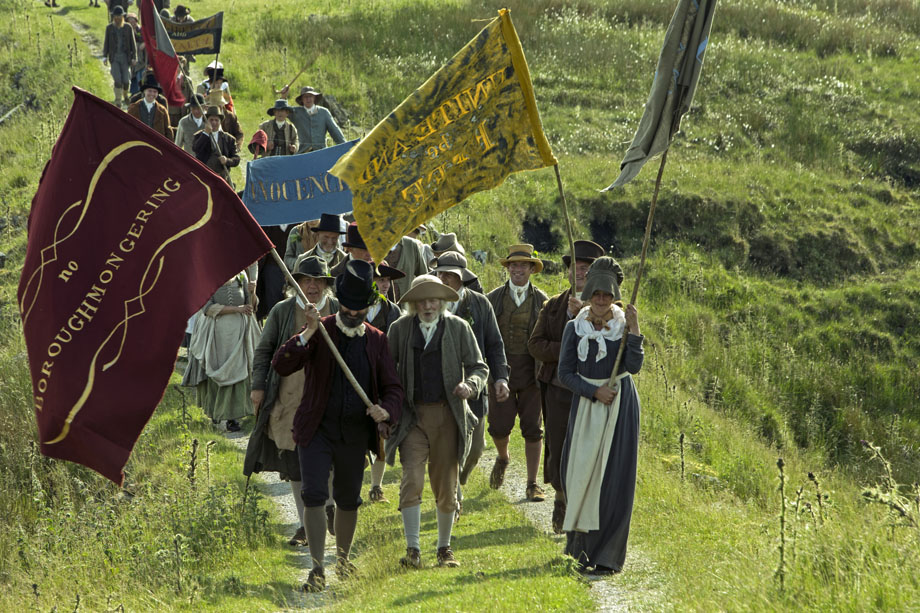In the wake of the Napoleonic Wars, the poor of England were famished, unemployed, and without parliamentary representation. Something needed to change to bring an end to their suffering. And so, in August of 1819, men, women, and children converged on Manchester’s St Peter’s Field as part of a peaceful demonstration demanding universal suffrage.
The local magistrates responded by charging cavalry into the field, killing 15, injuring hundreds more, and all but vanquishing the movement.
This event, which would come to be known as the Peterloo Massacre, seems a well-suited topic for director Mike Leigh to explore on screen. While he is perhaps best known for conjuring powerful, improvised performances and pairing them with a striking visual style, it is the humanist themes upon which the scenarios he presents are built that make him such an effective filmmaker. Putting them on the forefront to address a blight on British history that has not been properly acknowledged to this day is the kind of task he seems perfectly suited for.
That’s why it’s such a shame that Peterloo ultimately marks a major missed opportunity. Instead of establishing a traditional narrative in order to contextualise the issues at play, the film is mostly composed of a cavalcade of long-winded speeches and exposition dumps. Whether it’s journalists trying to figure out how to describe habeas corpus to their readers, or a family trading lines as they share their hopes for reform, nobody sounds natural or particularly engaging. Instead, it is as if they exist only to deliver information to viewers as directly as could be imagined. It’s heavy-handed, and is likely to see audience members following in the footsteps of one character who constantly interrupts a women’s suffrage group meeting to demand the speakers just talk in plain English.

It’s a problem that trickles down through the rest of Peterloo. Given no character beyond their status, everyone in the film feels like a cartoon. The magistrates are only a thin, twirlable mustache away from pure evil, while the poor are good-natured optimists whose wise analysis of politics far outweighs their social standing. We can empathise with their situation, but it’s hard to connect with the vast majority of characters as humans when all we get in the way of an introduction is a series of uncomfortable closeups as they react to yet another speech. Considering this is where Leigh usually excels, that’s a real disappointment.
Leigh and cinematographer Dick Pope have a long-standing relationship that lends their films a distinctive visual style. While that is the case for Peterloo as well, the style is often flat and uninspired, doing little to differentiate itself from anything we’ve seen set in the same era. Worse still is that, during the film’s eponymous massacre, it’s also confusing. Critical context is missing (How is the field set out? Where are familiar characters in relation to the soldiers? How can they escape?) and so the scene descends into visual chaos before coming to an abrupt end that will leave audience members unfamiliar with the specifics unsure about what exactly they have witnessed.
A ruthless editor might be able to cut an hour or so and deliver a film that works better, but as it stands, Peterloo is a hard recommendation. Leigh fans and history buffs may still find something to enjoy here, but everyone else should look elsewhere.
—
Peterloo opens in Australian cinemas on May 16th.
